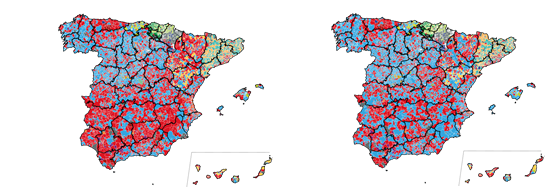Important election results
Local and regional elections were held in Spain on May 28, with a total of 67,031 city and town councils and mayors elected in all 8,131 municipalities, and new regional parliaments and governments in 12 of 17 autonomous regions.
All election results are available in detail at this link: elmundo.com. We will focus on a summary of the most relevant results:
From the beginning, these local and regional elections (28-M) were also seen by all relevant actors as a barometer for the national elections, scheduled for December 2023. Despite this dual perspective, voter turnout fell by 1.29% to 63.91% compared to 2019.
The socialist PSOE (Partido Socialista Obrero Español) has suffered dramatic losses of power. Of the 20 most populous cities, it now holds the mayoralty in only three. Of 9 autonomous regions, the PSOE lost another 6 last Sunday. The Socialists have thus lost substantial parts of their local and regional power base.
The electoral defeat of May 28, 2023, is the preliminary conclusion of a longer series of electoral defeats at the regional level for the PSOE, beginning in Galicia and the Basque Country in 2020, in Madrid in 2021, in Castilla y León and Andalusia in 2022.
To differentiate, it should be noted that the PSOE as a party lost only marginally: in the municipalities by 1.26 % (approx. 400,000 votes) and in the regional elections by 0.64 % (approx. 50,000 votes). Rather, the loss of power results from the breakaway of its coalition partners from the left-wing populist to far-left spectrum (including Podemos, Compromís, Izquierda Unida, Chunta, among others).
A remaining beacon for the PSOE remains Castilla-La Mancha, where Socialist government leader Emilio García Page, a staunch internal critic of President Pedro Sánchez, narrowly maintained an absolute majority. In addition, the Socialists in Asturias will probably continue to govern in coalition with left-wing populist to extreme left-wing forces (IU, Podemos). In the Canary Islands, too, the PSOE is likely to be involved in forming a government due to its voting weight. The PSOE did not wrest a single autonomous community from the PP.
The far-left Podemos, the PSOE's coalition partner at the national level, has effectively disappeared from the political map at the municipal and regional levels. It received the receipt for legislation that a majority of Spaniards decisively rejected (see reasons for election results). This new party founded in 2014, which, like the liberal Ciudadanos, is in danger of disappearing from the party landscape, was also affected by the fragmentation of the left camp. Newly founded parties such as the electoral alliance Sumar and other movements such as Compromís, Más Madrid, Más País and Izquierda Unida competed with each other.
Most dramatic was the collapse of Unidas Podemos in the autonomous community of Valencia, one of its most important strongholds, where it lost eight deputies and failed to clear the five-percent hurdle with the remaining 3.5 percent. Nor did the extreme left make it into the Valencian city parliament. Even more painful is the loss of their representation in the Autonomous Community of Madrid, where they also failed to make it into either the regional parliament or the city council over the five-percent hurdle. The same happened in the Canary Islands. In Aragón, La Rioja and the Balearic Islands, the left-wing populists and communists lost any chance of governing and retained only a few deputies in residual strength. Only in Navarre, in a general climate of political polarization, did they gain one seat to a total of three.
In the middle-class spectrum, the liberal-conservative People's Party PP (Partido Popular) gained 8.91 % at the municipal level and 8.72 % at the regional level. That is about 1.9 million votes more at the municipal level. It managed to soak up about 1.6 million votes from the liberal Ciudadanos.
The PP was able to win absolute majorities in the regions of Madrid and La Rioja. Madrid stands out in that the PP managed to achieve a double absolute majority for the country and the city of Madrid. Both Prime Minister Isabel Díaz Ayuso and Mayor José Luis Martínez-Almeida entered the election as incumbents. PP was able to win not only in the traditional wealthier neighborhoods, but also in the so-called "red belt". These are districts with lower-income populations that had been governed by socialist mayors for decades.
The PP won new relative majorities in Valencia, Murcia, Aragón, Cantabria and the Balearic Islands. In addition, the PP has the option of forming a regional government in Extremadura if, for example, Vox were to tolerate it.
At the municipal level, the PP won over the PSOE because, with 7.05 million votes or 31.5%, it received around 750,000 more votes than the PSOE (6.29 million votes or 28.1%). With 23,412 city and municipal councils, the PP received nearly 3,000 more mandates than the PSOE (20,784). With Madrid, Murcia, Almería, Badajoz, Cádiz, Córdoba, Granada, Logroño, Málaga, Melilla, Oviedo, Salamanca, Santander and Teruel, the PP won absolute majorities in many relevant major and provincial capitals.
Since the mayors of Spanish cities and municipalities are elected in only one ballot and with simple majorities in the absence of an absolute majority, the PP has the chance to govern also in Valencia, Seville, Albacete, Alicante, Burgos, Cáceres, Castellón, Ceuta, Ciudad Real, Guadalajara, Huelva, Huesca, Palma, Segovia, Valladolid and Zaragoza.
The liberal Ciudadanos (C's), founded only in 2006, is also in danger of disappearing from the political map. It was unable to win a single new regional deputy and now holds only 392 city and municipal councils in the whole of Spain (-2,395).
The ultra-conservative Vox doubled its vote total from 812,804 (2019) to 1.61 million (2023), tripling the number of city and municipal councils that will be represented by Vox in the future (1,695). As a result, Vox rose in the rankings to become the third most powerful force (7.2%). The ultraconservatives are growing throughout Spain and can complete their territorial coverage by now entering the regional parliaments of Castilla-La Mancha, Comunidad Valenciana, Extremadura, La Rioja and Navarra. Only the poor performance in the Autonomous Community of Madrid, where the party lost three mandates (2021: 13, 2023: 10), is a downer for chairman Santiago Abascal.




